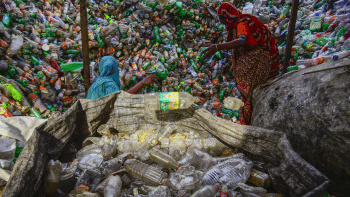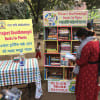Bangladesh recycles only 36% plastic waste: experts

Only 36 per cent of the 8.25 lakh tonnes of plastic waste Bangladesh produced in 2019 were recycled whereas the amount was 51 per cent in 2006, a matter of big concern for the country, an expert said today.
"But it is also worth mentioning that the volume of plastic recycled in 2019 was higher than that of 2006 thanks to a huge rise in plastic use in Bangladesh," said Professor Ijaz Hossain, former dean of the engineering faculty at Bangladesh University of Engineering and Technology.
"In another way, it can be said that 64 per cent of the plastic people in Bangladesh use are not discarded properly, which are polluting the environment."
So, a clear policy is required to identify the method for plastic waste collection and their reuse to take into account the efforts of the plastic recyclers and support the makers of recycled plastic products, he said.
For example, it could be proposed that 40-60 per cent of the raw materials to produce non-food grade plastic products should come from recycled plastics, the professor said.
He made the comments at a seminar on "Plastic waste recycling: investment progress, challenges and way forward" at Cirdap International Conference Centre in Dhaka today.
The SME Foundation and Bangladesh Plastic Goods Manufacturers and Exporters Association (BPGMEA) jointly organised the event.
There is no definite guideline for manufacturing of recycled plastic products in Bangladesh, Hossain said.
The Draft National Plastic Industry Development Policy 2020 along with the other existing policies for export, import, industries and small and medium enterprises are not sufficient to establish a strong recycled plastic sector, he said.
Bangladesh exports $1.2 billion worth of plastic products a year and the local plastic product manufacturers have the potential to increase shipments if they are provided with proper policy support, he said.
Along with the increase in the use of plastic products, plastic waste is also increasing, which is affecting the environment, said Mafizur Rahman, managing director of SME Foundation.
"In order to reduce its harmful impact on the environment, it is necessary to increase awareness on investment and creation of new entrepreneurship in the sector for reuse of used plastic through recycling."
"There are many plastics that remain in our environment for more than 30 years," Rahman said.
The plastic sector's contribution to the economic development of the country has increased every year with the establishment of new plastic industries, said Shamim Ahmed, president of BPGMEA.
Investment and employment are increasing in this sector and the country is now earning more foreign exchange through the export of plastic products to the international markets, he said.
Around Tk 4,000 crore worth plastic products are sold every year in the country and over 12 lakh people are currently employed in the sector, Ahmed added.
Bangladesh recycles above 50 per cent of its waste plastic, which is much higher than other countries in the world, he said.
He urged the government to take steps for the creation of a circular economy cell or division for the plastic sector.
There are about 500 waste recycling companies in the country and steps should be taken to collect value added tax from them properly, he said.
It is high time to formulate policies on plastic waste management, said Md Jashim Uddin, president of the Federation of Bangladesh Chambers of Commerce and Industry.
However, if any kind of restrictions are imposed on the traders suddenly, it will be suicidal for the common people and the economy, he said.
"The policy should be business-friendly and there should be an acceptable time frame for its implementation."
In order to keep pace with the developed countries, the government should pay special attention to the recycling sector along with the private sector, Jashim Uddin said.
The government is planning to approve the plastic industry development policy soon and implement it by February this year, said Salim Ullah, senior assistant secretary for policy at the industries ministry.

 For all latest news, follow The Daily Star's Google News channel.
For all latest news, follow The Daily Star's Google News channel. 









Comments